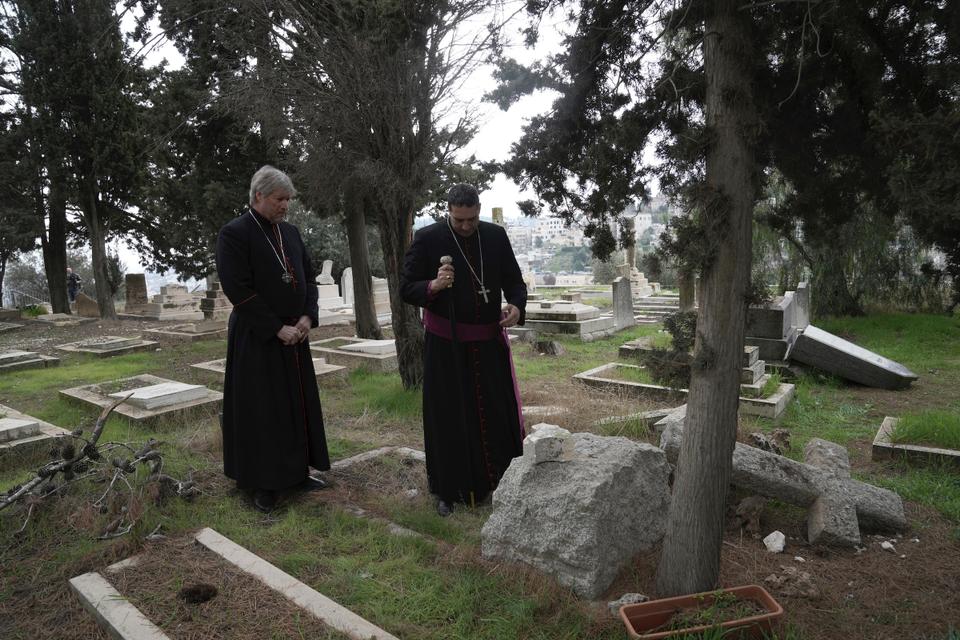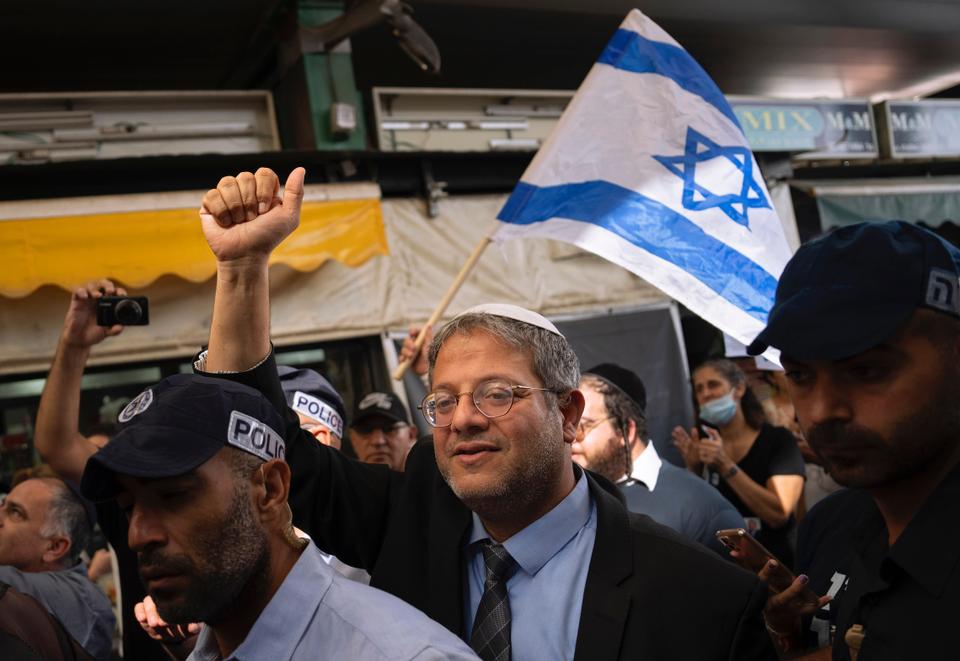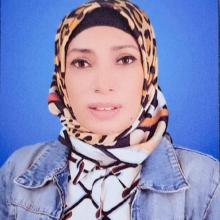After Christian graves were vandalised in Mount Zion, religious leaders and analysts blame the rise of extremism represented in the new Israeli government for growing religious-based attacks.
Christian and Muslim religious sites have been desecrated for over 50 years in the occupied West Bank and such acts will continue, analysts and religious leaders have said, after two young Jews were caught on camera vandalising Christian graves near Mount Zion in occupied East Jerusalem.
The perpetrators, wearing kippahs and tallit katans, were seen toppling crosses and smashing more than thirty gravestones, many of which were historical.
Among those vandalised tombstones was one containing the bust of the Right Reverend Samuel Gobat, the second Protestant Bishop in Jerusalem and the founder of the adjoining Jerusalem University College, formally known as the Gobat School, the Episcopal Diocese of Jerusalem said in a statement.
“It is a systematic policy which has been aroused by extremist Israelis against
Islam and Christianity equally,” Reham Owda, a Gaza-based Palestinian political analyst and writer, told TRT World.
Owda’s comments were echoed by Father Donald Binder, who also condemned the vandalism at the Protestant Cemetery and added that perpetrators were motivated by religious bigotry and hatred of Christians.
“This is not the first such attack on this cemetery, it is clearly part of a systematic pattern of attacks against Christian sacred sites and cemeteries on Mount Zion,” Binder said in a statement.
The priest called on Israeli authorities to pursue, apprehend, and prosecute the assailants of this crime to the fullest extent of the law, including those of hate crimes.
Israeli police said investigators from the David area in the Old City of occupied East Jerusalem were sent to the scene to collect evidence. According to their statement, the investigators have successfully identified the suspects, who are statement, the investigators have successfully identified the suspects, who are 14 and 18 years old, confirming that the young men were summoned for questioning.“As long as there is no action to stop these criminals, we shall expect more of such attempts, especially after the swearing-in of the new Israeli government a couple of weeks ago,” Owda said.

Hosam Naoum, a Palestinian Anglican bishop, right, stands with a colleague where vandals desecrated more than 30 graves at a historic Protestant Cemetery on Mount Zion in occupied East Jerusalem, Wednesday, Jan. 4, 2023. (Mahmoud Illean / AP)
According to Palestinian political analyst Akram Attallah, such attacks will continue for several reasons.
“First, extremist Israelis now feel psychologically stronger than ever, especially after the most religious and hardline government in Israel was elected,” Attallah told TRT World, adding that “they feel relatively protected under the Israeli political system”.
There is also a political desire in Israel to take control of Jerusalem and to erase any non-Jewish features in an attempt to assert a Jewish takeover of the city, Attallah noted.
Hana Bendcowski, programme director at the Rossing Center for Education and Dialogue in West Jerusalem, said the attacks do not bear any political motivation and represent an “aggressive extreme” of a minority in Jewish society.
“These acts are related to tensions and hostility between Christians and Jews throughout history,” Bendcowski told TRT World.
While she doesn’t believe it has anything to do with the Israeli-Palestinian situation, Bendcowski indicated that the growing atmosphere of violence in Israel had led some to express themselves more aggressively.
‘Holy place for everybody’
Ronnie Shaked, an Israeli political analyst, said he was “ashamed” as both an Israeli and a Jew for the vandalism at Mount Zion.“I went to the cemetery three weeks ago to visit the grave of Oskar Schindler. He is a very important person, who with his wife saved the lives of many Jews during the Holocaust,” Shaked told TRT World, referring to the man immortalised in Steven Spielberg’s multiple Oscar-winning Schindler’s List.
Many Jews visit Mount Zion, which Shaked described as a “holy place for everybody”.
Mount Zion is sacred to Christians and Muslims, as well as the Jewish people, who believe it is home to King David’s tomb. The site, where Christians believe Jesus's Last Supper took place, has also been holy to Muslims since they converted it into a mosque honoring David, whom they consider a prophet.
Mount Zion cemetery was created in the middle of the nineteenth century following the birth of a small community of Christians belonging to western European Protestant churches.The first bishop Michael Alexander, appointed jointly by Prussia and England in 1841, was a converted Jew. And though the graveyard was formally opened only some years after his death, his body was brought to Mount Zion from Egypt, where he died in 1845 to be buried in the city.
The bust of Bishop Gobat, Alexander’s successor, on his grave was among those vandalised. Most recently, the graveyard became the final resting place of Shireen Abu Akleh, the Palestinian journalist who was killed by Israeli soldiers last May.
Reverend Ashraf Tannous, Pastor of the Evangelical Lutheran Church of the Reformation in Beit Jala, told TRT World that the vandalised graves in the cemetery speak to the history of the Protestant churches in Israel.
Tannous said, “Many of the buried whose tombstones were destroyed by those criminal settlers are symbolic to us as Christians”, like the grave of Sister Najla al Sayegh, a Palestinian nun who was the principal of a famous school in the city.
“These vandalism incidents against Christian cemeteries constitute a systematic chain of attacks which started long ago, probably since the establishment of the state of Israel, and I think they will never stop, but they occur at stages, just like similar attacks against Muslim cemeteries.
Israeli authorities have also desecrated Islamic cemeteries in Jerusalem through exhumations, excavations and construction projects.
In September 2021, Israeli forces began demolitions at the Al Yousufiya cemetery in occupied East Jerusalem, following a decision by authorities to build a biblical-themed park atop the historical cemetery that dates back to the Ayyubid dynasty.

One of the members of Israel's new far-right government is national security minister Itamar Ben-Gvir, a former lawyer who defended Israelis accused of religiously motivated attacks and has previously called for the displacement of Palestinians. (Oded Balilty / AP)
Far-right extremism
What keeps Tannous and other Christians worried is that the Israeli police statement stressed that one of the perpetrators was a minor, which might lead to lenient action against them.
“I hope that the criminals,
as they deserve to be called, would receive the punishment that they are
worth and that the police would not justify their deeds and consider
them mere childish or crazy acts like they usually did in similar
situations,” Tannous said.“The Israeli police must take serious steps to bring the vandals to justice.”
The timing of the vandalism is also significant, as it took place after Israeli Prime Minister Benjamin Netanyahu’s most far-right-wing government was sworn in.
“We expect more of such attempts as long as there is no deterrence to stop these criminals, especially since Benjamin Netanyahu is now leading Israel’s most far-right government since its creation,” Owda said.
They include polarising figures like Itamar Ben-Gvir – the newly-appointed National Security Minister – who recently tweeted, “it is time to be the landlord in our country!”
Ben-Gvir, the head of the far-right Jewish Power party, stormed the Al Aqsa Mosque compound on January 3 in a move Palestinians called a “deliberate provocation,” one that marked the first symbolic act of the new government on Islam’s third holiest site.
“As long as his partners headed by Itamar Ben-Gvir are encouraging hate speech against non-Jews publicly, then Ultra-Orthodox Jews will be emboldened to attack non-Jewish symbols visibly,” Owda added.













0 Comments